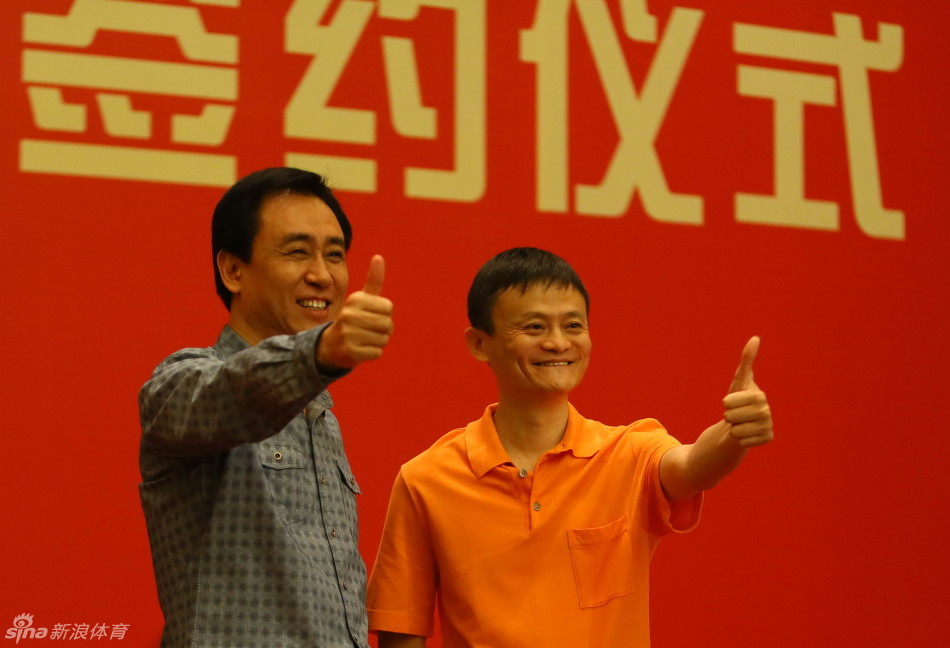Jack Ma’s Alibaba company have bought a 50 percent stake in current Chinese and Asian football champions Guangzhou Evergrande, parting with 1.2 billion RMB (140 million Euro) for their stake in the club.
The investment was announced at Evergrande hotel in Guangzhou, where Ma met with Xu Jiayin, owner of the property development company, to seal a deal that represents the biggest investment ever seen in an Asian football club.
Ma had previously been in talks to purchase 49 percent of Hangzhou Greentown, which would have seen him invest heavily in the club’s youth infrastructure. That deal, though, was not good enough to prevent Evergrande persuading Ma to invest in their product.
“We’re not investing in football, we’re investing in entertainment,” Ma told reporters on Thursday morning, where Evergrande unveiled the company as a “strategic investor”. “Alibaba’s future strategies are health and entertainment.”
With Alibaba soon to float an IPO package on the stock market, a move which Reuters report could value the firm at $152 billion, their sudden determination to enter the entertainment industry is understandable. The speed of their investments, though, is raising eyebrows within the financial community.
Here, US-based website Techcrunch attempt to explain Ma’s sudden interest in football:
The investment may be part of an effort by Alibaba to extend its core offerings beyond e-commerce and into online entertainment ahead of its IPO, as it faces more competition from other e-commerce firms like JD.com, which recently held a successful IPO. Other recent investments that can bolster Alibaba’s online entertainment offerings include Youku.
At the press conference, Evergande owner Xu Jiayin also spoke of the board’s intention to sell another 40 percent of shares to 20 separate investors in 2 percent increments in the future. Any such move would reduce both Evergrande and Alibaba holdings to 30 percent apiece, but creates the possibility of significant cash injections further down the line.
Having invested massively in infrastructure and brought in massively increased revenue, Evergrande are now in a position to profit from their football vision. They have already seen their new spring water business expand rapidly off the advertising offered by the club and will now reap the rewards of Ma’s investment, albeit with the need to share control of their club.
Regardless of Evergrande’s long-term intentions, the deal is a major indication of the potential of Chinese football. Ma clearly believes that there is still unlocked earning potential in Evergrande football club despite the incredible value of the deal at present and, indeed, the Alibaba owner described the purchase as “cheap” when asked to comment on the valuation of the deal.
Fascinating. Alibaba invests CNY1.2 bln in soccer club Guangzhou Evergrande. Terms decided in 15 minute phone call. http://t.co/nGxsyVLLM8
— Paul Mozur (@paulmozur) June 5, 2014
In part, that opinion may be influenced by major sponsorship deals secured by the club in the past six months.
Per CNBC, the Evergrande group reported advertising revenues of 363 million yuan (42 million Euro) from its football and volleyball clubs, up 23 percent from the previous year. They have since signed major deals with Dongfeng Nissan and Nike for sponsorship on the football side of the business, with the former valued at 100 million RMB (12 million Euro) for one season.
At present, the club lie top of the Chinese Super League in their pursuit of a fourth consecutive title. In August, they will take on Western Sydney Wanderers in the quarterfinal stage of the AFC Champions League as they bid to become the first side ever to retain the title and earn a place alongside Real Madrid at the 2014 Club World Cup in December.
